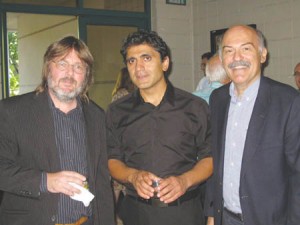Ruzan Orkusyan
Staff Writer

On Sunday afternoon, September 18, 2011, a full house at the Fresno State Concert Hall was transported into the vibrant world of do, re, mis. The talented pianist Vardan Mamikonian dazzled an attentive audience of more than 400 with passages from Liszt, Bach, and Chopin, allowing the audience to escape into a fantasy, forgetting for a few hours their daily toils and troubles.
Co-sponsored by the Armenian Studies Program, the Mamikonian performance was the first in this 40th season of the Philip Lorenz Memorial Keyboard Concert Series. All Keyboard Concert Series programs this year are dedicated to the 200th anniversary of the 19th century composer Franz Liszt. Fittingly, the concert began and ended with two Liszt pieces, “La lugubre gondola II,” and “Sonata in B Minor.” Mamikonian also played Bach’s “Chaconne in D Minor” and selected “Etudes” from Op. 10 of Chopin, demonstrating his versatility and technique.
Born in Yerevan, Armenia, Mamikonian began studying piano at the Yerevan Spendiarian School of Music, continuing to the Moscow Central Music School, the prestigious Tchaikovsky Conservatory, and the Piano Academia in Imola, Italy.
He was the winner of the World Music Masters Competition in Monte Carlo in 1992—a prize reserved only for previous winners of international competitions. He has performed at countless prominent venues around the world including the Musikverein (Vienna), Carnegie Hall (New York), Wigmore Hall (London), and the Kennedy Center (Washington D.C.). He has appeared with countless world-renowned symphonies, and has recorded extensively for radio and television. He has gained worldwide attention and recognition for his “elegant technique and superb musicianship.”
The audience watched with great pleasure, as Mamikonian skillfully played each note. The music seemed to consume him at times, tower over him, and proclaim its victory. At other times, Mamikonian seemed to be the master, commanding the notes to play. Nowhere was this clearer than in Bach’s “Chaconne in D Minor.” Struggles manifested themselves with clear crescendos, a battle between good and evil, and in the next instance the music would decrescendo to a soft murmur.
Following his final number, a standing ovation congratulated and praised the talented musician, and he humbly indulged the audience with two encores, the last of which was a new rendition of Aram Khachaturian’s “Sabre Dance,” that Mamikonian himself had arranged.
Lost in the dynamic world of Mamikonian’s music, it was easy to forget about the real world, to lose oneself in the colorful images created by the flittering notes.
 Hye Sharzhoom Armenian Action
Hye Sharzhoom Armenian Action